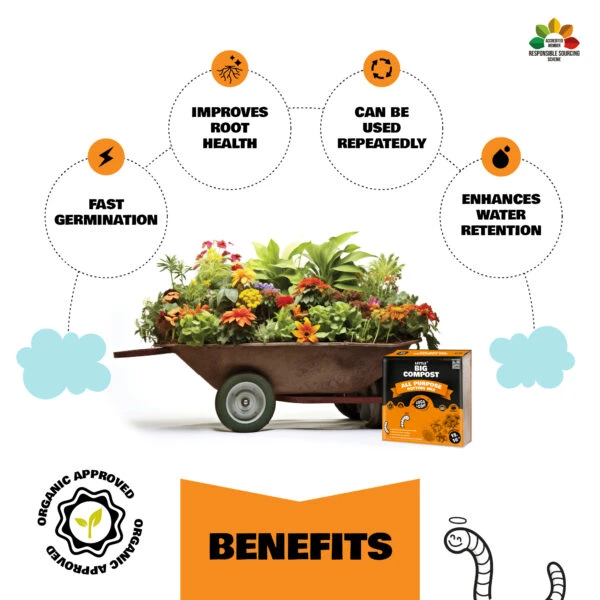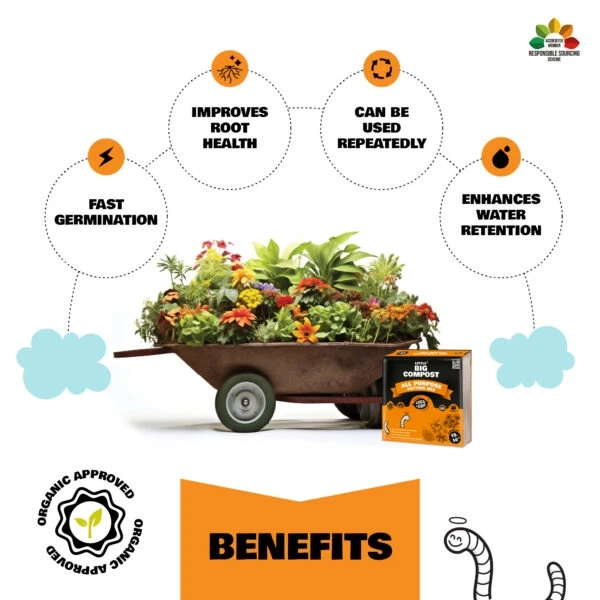
In recent years, gardeners and environmentalists have been turning their attention to peat free compost — and for good reason. This sustainable alternative to traditional peat-based composts offers a variety of benefits for the environment, soil health, and garden performance. Whether you’re an avid gardener or just starting out, understanding what peat free compost is and why it matters can help you make more eco-conscious decisions.
What Is Peat Free Compost?
Peat free compost is a type of growing medium made without peat moss. Instead of relying on peat harvested from bogs, these composts are made from a mixture of natural and renewable materials like:
- Coconut coir
- Wood fibre
- Green waste
- Compost bark
- Composted garden waste
The aim is to create a nutrient-rich blend that supports plant growth without contributing to environmental degradation.
Why Is Peat Used in Compost?
Traditionally, peat has been used in compost for its moisture-retaining properties and light texture. It's effective at supporting plant roots and improving drainage. However, the extraction of peat has significant downsides.
The Environmental Impact of Peat Harvesting
Peat bogs are carbon-rich ecosystems that take thousands of years to form. They store more carbon than forests, making them vital in the fight against climate change. When peat is extracted:
- Large amounts of carbon dioxide are released
- Biodiversity is disrupted
- Natural water regulation systems are damaged
This makes peat harvesting a major contributor to environmental damage and global warming.
Benefits of Peat Free Compost
Switching to peat free compost brings several advantages, both for your garden and the planet.
1. Protects Natural Habitats
Peat free compost helps preserve peat bogs — crucial habitats for many rare plants and animals.
2. Reduces Carbon Emissions
By avoiding peat extraction, these composts help reduce greenhouse gas emissions.
3. Promotes Soil Health
Organic materials in peat free blends improve soil structure and fertility over time.
4. Encourages Recycling
Many peat free composts are made using green waste, reducing landfill and supporting the circular economy.
Common Ingredients in Peat Free Compost
Here’s a look at what typically goes into peat free compost:
- Coconut coir: A by-product of the coconut industry, used for its excellent water retention and aeration.
- Composted bark: Adds structure and breaks down slowly, enhancing soil over time.
- Green waste compost: Made from garden clippings and food scraps, it’s rich in nutrients.
- Wood fibre: Improves aeration and moisture balance in the mix.
Is Peat Free Compost as Effective?
Yes, when properly balanced, peat free compost performs just as well — sometimes even better — than peat-based alternatives. Gardeners report healthy plant growth, better water retention, and improved drainage. However, it’s important to choose quality brands that ensure consistency and nutrient content.
Best Uses for Peat Free Compost
Peat free compost can be used in various gardening applications:
- Potting plants
- Starting seeds
- Mulching garden beds
- Improving soil in raised beds and borders
Some blends are formulated specifically for certain plants like vegetables, flowers, or shrubs. Always check the label for suitability.
How to Transition to Peat Free Compost
If you’re new to using peat free compost, here are a few tips:
- Start small – Test it on a few pots or planters.
- Mix with garden soil – For larger beds, combine peat free compost with existing soil.
- Adjust watering – Peat free mixes may dry out faster or retain water longer, depending on ingredients.
- Feed regularly – Some peat free options may need more frequent feeding with organic fertilizers.
Choosing the Right Peat Free Compost
Not all peat free composts are the same. Look for products that are:
- Certified organic
- Free from plastic or synthetic additives
- pH balanced
- Suitable for the types of plants you’re growing
Brands that disclose their ingredient list are generally more trustworthy and eco-conscious.
The Growing Movement Against Peat Use
Countries like the UK have begun taking steps toward banning the sale of peat-based composts. Garden centres are also starting to stock more sustainable alternatives in response to consumer demand and environmental concerns.
Future of Sustainable Gardening
Peat free compost is just one step toward a more sustainable gardening practice. Pair it with other eco-friendly habits such as:
- Using rainwater for irrigation
- Avoiding chemical pesticides
- Choosing native or drought-tolerant plants
- Practicing crop rotation and companion planting
These efforts together create a greener, more resilient garden environment.
Final Thoughts
Peat free compost offers a practical and environmentally responsible alternative for home gardeners and professionals alike. It supports healthy plant growth, nurtures the soil, and most importantly, helps protect the planet’s precious peatlands. Making the switch might take a little adjustment, but the long-term benefits are well worth it.


